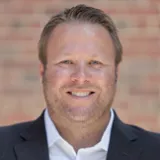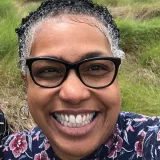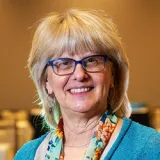Voyager Sopris Learning EDVIEW360 Podcast Series

Using the Data You Already Have to Help Students with Dyslexia
Released: Wednesday, November 16, 2022
When you examine your teaching approaches and how to best help students with dyslexia, it can be easy to assume special data will be needed to help these students improve their foundational reading skills and move toward grade-level literacy.
However, the data you already have from regular assessment practices, like that collected from Acadience® Learning measures, can provide invaluable insight to help you tailor instruction and ensure all students—especially those with dyslexia and other reading challenges—receive the appropriate and timely intervention they need to succeed.
Our guest for this EDVIEW360 podcast is Matthew K. Burns, a literacy, assessment, and special education expert who has dedicated his career to improving the lives of the most-vulnerable children, including those with disabilities, from high-poverty backgrounds, and for whom English is not their native language. Dr. Burns will share how schools can help shape K–12 practice and improve literacy using existing data.
He will also discuss how educators can:
- Use data to target reading interventions for students with dyslexia
- Identify breakdowns in the learning process to better increase reading skills
- Match reading interventions to student need
- Improve students’ reading skills through schoolwide Multi-Tiered Systems of Support, such as Response to Intervention, and school-based teams, like problem-solving teams and professional learning communities.
We hope you’ll join us for this fascinating podcast!
The Power of Print: Inspiring Classroom Discussion and Motivation
Released: Wednesday, October 05, 2022
Join us for an inspiring conversation with Dr. Louisa Moats, author of LETRS® professional learning and LANGUAGE! Live® reading intervention, as we talk candidly about the power of printed books and materials and how educators can best select and use them to encourage student motivation and engagement—while helping all students build essential reading skills.
Dr. Moats will share her thoughts about digital fatigue, the power of print, in what ways teachers and students should be trusted to select what they read both inside and outside of the classroom, and more.
This conversation will provide thought-provoking information for all administrators and teachers who work with struggling readers, especially those in middle school and beyond.
How Handwriting Supports the Science of Reading
Released: Saturday, October 01, 2022
After taking a backseat in the education world for many years, handwriting is back. While assistive technology can help students with writing problems, it does not remove the importance of teaching explicit handwriting. Handwriting reinforces reading and spelling skills, and is linked to reading and spelling achievement. In this insightful podcast, you will learn how handwriting supports the science of reading and strategies educators can use immediately in the classroom to build handwriting into their daily lessons.
In this podcast, listeners will learn:
- The connection between handwriting, reading, and writing
- The evidence around two “great debates”
- Printing or cursive?
- Handwriting or keyboarding?
- Key recommendations for handwriting instruction

Future Ready Literacy: How Leaders Can Implement Schoolwide Culture Change
Released: Wednesday, September 07, 2022
It’s no secret: School and district leaders set the tone for the culture within the organization. Although every employee is ultimately responsible for creating an environment where students want to be, school leaders must model the way. How can principals looking to implement change create an innovative, sustainable culture that consistently models future ready learning, relies upon a level of teaching and learning backed by science, and promotes a high level of literacy success for all students?
Join us as we talk with our guest, best-selling author Thomas C. Murray, a lifelong educator who is now the director of innovation for Future Ready Schools®. In his current role, Murray works with districts to create the types of learning experiences today’s modern learners need to thrive. As a previous secondary and elementary principal, he knows the importance of helping every child learn to read proficiently, and how to intervene when children don’t have the literacy skills needed by third to fifth grades. On a daily basis, he works with principals and superintendents on systems change, sustainability, and equity and resolving culture-change obstacles standing in the way of students achieving the level of literacy success that allows each one to truly be future ready.
Join us as we talk with our guest and explore:
- What it means to be future ready for a student, teacher, administrator, and school
- Leveraging the The Future Ready Framework for sustainable change
- Why buying a great literacy program or intervention is not enough. If you don’t create a culture where people can learn it, believe it, and use it well, it can’t teach itself
- How do we make sure every child has the opportunity to learn? It goes well beyond technology
- The importance of community partnerships and relationships
Meaningful Assessment—And Why It Is Critical for Reading Success
Released: Thursday, August 04, 2022
In this podcast, Dr. Ruth Kaminski, coauthor of Acadience® Learning K–6 and other respected assessments, will discuss the many aspects of assessment that make it a meaningful and essential tool for preventing reading disabilities and promoting reading success.
Join us as we talk with Dr. Kaminski about the reasons educators should rely upon assessment for curriculum alignment, progress monitoring, and classroom planning.
We’ll explore:
- The critical nature of assessment
- Who should be assessed, when, and how often?
- How assessment can help teachers align their reading instruction with the science of reading
- The various features of assessment that make it meaningful for teachers
How Explicit Writing Instruction Can Compensate for Gaps in Background Knowledge
Released: Tuesday, July 05, 2022
Writing is potentially the most powerful lever we have for building knowledge and improving reading comprehension. It can uncover gaps in background knowledge that prevent students from accessing grade-level material. And, because writing helps new information stick, it can also boost students’ academic performance.
But writing is the most difficult thing we ask students to do. If inexperienced writers are asked to write at length, they can easily become overwhelmed as they juggle everything from spelling to word choice to organizing their thoughts. And if students are asked to write only about personal experience or topics in a separate writing curriculum, writing won’t help them acquire the knowledge they need to succeed in school.
Join this informative podcast as we talk with esteemed researcher and author Natalie Wexler. She will share ways to make writing less overwhelming by starting at the sentence level and how to include writing activities in the content of the core curriculum. This is an approach that shouldn’t be limited to English classes. It can have powerful effects in any subject—and at any grade level.
Digital Divides, Opportunity Gaps, and Literacy Achievement
Released: Thursday, June 16, 2022
How can districts ensure all students have the same opportunities to the best education if all facets of learning are not equitable? The Digital Divide is not just about devices and the Internet, but it is also about pedagogy in our classrooms and opportunities for students. In this podcast, we will explore the different types of digital divides that occur in our schools with an award-winning equity expert, and we will also address the impact these divides have on literacy learning. Join us and see what you can learn from our guest as he shares the ways he and his district strive for absolute learning equity.
Nurturing Teachers and Students: Creating a Safe Space for Teaching and Learning in Troubling Times
Released: Thursday, May 05, 2022
Today, more children are arriving at school with significant social and emotional vulnerabilities due to the chronic stress and trauma of the pandemic. Our students have experienced stress and trauma in the past, but this moment is unique because the experience is more universally shared. This period is also exceptional because our teachers have experienced the chronic stress, loss, and uncertainty of the pandemic as well as our students. Teachers are often given the role of superheroes in our society, but we cannot ask teachers to give of themselves what they do not have. While it is urgent we address our students’ social and emotional needs, it is equally urgent that we address the needs of our teachers, if they are going to help students.
This podcast will address hands-on activities and strategies for supporting teachers and students with care and connection. Language allows us to identify and express our emotions. Our use of language to assist in our efforts to connect with our students can transform traditional instruction into “trauma-informed” instruction. Language and connection have the power to heal. Connecting with students does not cost money and can create a climate and culture that can change a child’s life.

We Know HOW to Teach Children to Read: Let's DO It!
Released: Tuesday, April 12, 2022
Too many students in our classrooms struggle with learning to read. This does not need to occur. Research has shown that approximately 95% of all students can be taught to read at grade level, including those with learning disabilities and dyslexia. How can we meet the needs of every student in today’s classrooms? We'll discuss the characteristics of students who become our struggling readers along with research-supported and classroom-proven approaches to successfully address these students' needs.
Getting Reading Right: Why California Overhauled the Way Literacy Is Taught
Released: Thursday, March 10, 2022
In 2017, students, teachers, and activists filed a class action lawsuit (Ella T. vs. the State of California) arguing that state education officials knew there was a crisis of reading and writing in California public schools, but had failed to develop a plan to address it.
That lawsuit resulted in a $53 million settlement — money that didn’t go to the plaintiffs, but rather to 75 of the lowest performing schools in the state–an acknowledgement that the ten students who sued represent hundreds of thousands who have been failed by a broken educational system.
Last year, the schools engaged in professional development through the Sacramento County Office of Education and developed literacy action plans that intend to overhaul how they teach literacy. Educator Margaret Goldberg led sessions to help site leaders plan changes to their curricula, assessments, and teaching strategies. She now mentors the literacy coaches of these schools and works as an early literacy coach at one of the sites.
Listen as we talk to Goldberg, a full-time literacy coach, co-founder of The Right to Read Project, and an integral part of the solution in her state. Listeners of this podcast will be inspired as Goldberg shares the state’s new approach, process, exciting outcomes, and her experiences witnessing literacy outcomes improve.
In this podcast, Goldberg will discuss:
- The difference between “then” and “now”—and how a new approach to teaching reading based on Structured Literacy and the science of reading will alter the trajectory for thousands of students
- The process used to deepen educators’ understanding of the research about reading and how they apply that to coaching
- What implementation looks like now, and how it will evolve in coming years
- What school leaders and literacy teams at each of these schools are learning, and how they plan to change the way reading is taught
- Righttoread.com, and how you can get involved
Maximizing Equity & ESSER III Funds: Smart Decision-Making for Districts to Accelerate Learning for ALL Students
Released: Tuesday, February 22, 2022
As districts prepare for the remainder of this school year and the many needs ahead, educators must make crucial decisions for appropriate use of ESSER III funding. However, before purchasing priorities can be planned, there are important questions to ask and new funding parameters to explore that will help all educators make the best decisions to ensure educational equity for every student. Additionally, looking back at last year’s funding decisions can help inform the best use of new funds. Join Lexia® Learning’s Director of State Initiatives, Jon Hummell, and Education Department Relations Manager, Brittany Martin, for an illuminating podcast conversation about strategies and considerations for effectively leveraging relief funding.
In this podcast, our funding experts will discuss:
- Determining whether district purchases with previous funds were effective or not
- Lessons learned about the investments districts made so far
- What do these purchasing decisions mean going forward?
- What are some of the best ways to use ESSER III funds?
- How can spending decisions improve and advance a district toward equity?
And much more!
Add your email here to sign up for EDVIEW360 blogs, webinars, and podcasts. We'll send you an email when new posts and episodes are published.

Pam Austin has over 36 years of experience as an educator. Her current role as a Professional Learning Facilitator Manager and previous positions as the Director of Instructional Technology, and Professional Learning Facilitator includes over 17 years of experience in training and supporting districts in various literacy and numeracy interventions for Voyager Sopris Learning in addition to delivering LETRS professional development sessions.
She has also shared her love of proven VSL solutions as a product marketing manager when she began her role as a EDVIEW360 podcast host in 2019 and continues to this day. Her goal is to aid teachers in changing the lives of students so that they not only become proficient and successful learners, but also, individuals confident in pursuing personal and professional life goals. She previously held the role of literacy specialist at the Center for Development and Learning (CDL) now the Center for Literacy and Learning.
As an educator, in the New Orleans Public Schools for 14 years, she served as an elementary teacher, a reading interventionist, a school-based reading coach, and a Central Office Field Literacy Facilitator. These varying roles allowed her to gain a myriad of experiences that has enhanced her ability to work in collaboration with other educators, schools, and districts for impactful professional learning. Pam’s first steps into a life-long career as an educator began as a fourth-grade teacher, in small school, in the Archdiocese of New Orleans. And the journey continues…









